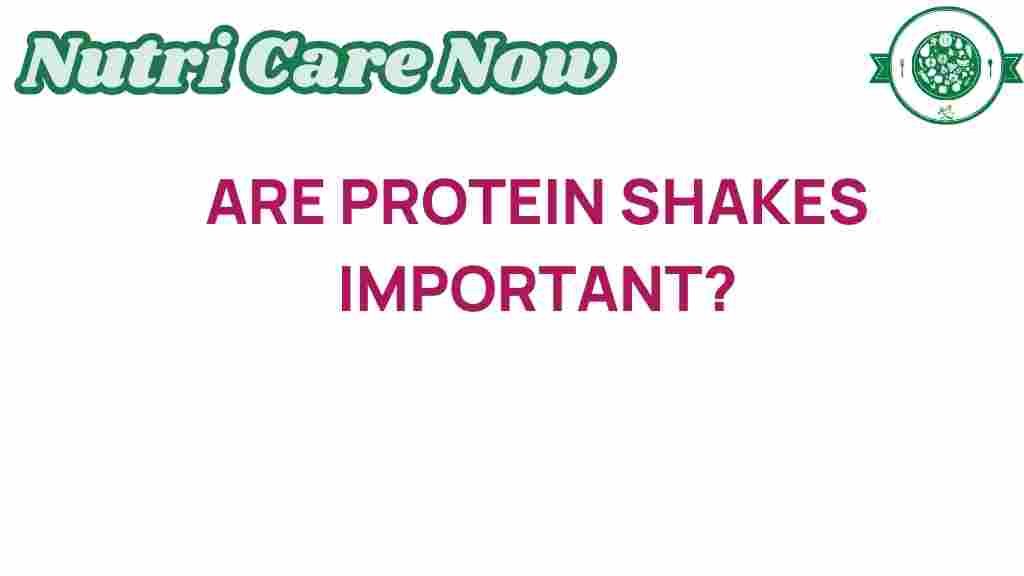The Protein Shake Debate: Are They Essential for Your Health?
In recent years, protein shakes have surged in popularity, becoming a staple in the diets of fitness enthusiasts, athletes, and health-conscious individuals. But are they essential for your health? This article will delve into the debate surrounding protein shakes, exploring their health benefits, role in muscle recovery, and place within a balanced nutrition plan.
Understanding Protein Shakes
Protein shakes are dietary supplements that typically consist of protein powder mixed with water, milk, or a milk alternative. They are designed to help individuals meet their protein intake goals, which is crucial for various aspects of health, including:
- Muscle recovery
- Exercise performance
- Weight management
- Overall nutrition
Protein shakes can be made from various protein sources, including:
- Whey protein
- Casein protein
- Plant-based proteins (e.g., pea, hemp, soy)
- Egg protein
The Health Benefits of Protein Shakes
When considering whether protein shakes are essential for your health, it’s important to understand their potential benefits:
1. Enhanced Muscle Recovery
One of the primary reasons fitness enthusiasts consume protein shakes is for muscle recovery. After an intense workout, your muscles need protein to repair and grow. Studies suggest that consuming protein soon after exercising can:
- Speed up recovery time
- Reduce muscle soreness
- Promote muscle protein synthesis
2. Improved Exercise Performance
Protein shakes can serve as effective workout fuel. By providing a quick source of protein and calories, they can help maintain energy levels during workouts, leading to improved exercise performance. This is especially beneficial for those engaging in high-intensity training or endurance sports.
3. Convenient Nutritional Support
In today’s fast-paced world, finding time to prepare balanced meals can be challenging. Protein shakes offer a convenient way to boost your protein intake without the need for extensive meal prep. They can be consumed on-the-go, making them a suitable option for busy lifestyles.
4. Weight Management
For those looking to lose weight or maintain a healthy weight, protein plays a crucial role. High-protein diets can increase satiety, reducing overall calorie intake. Incorporating protein shakes into your diet can help you achieve your dietary goals by:
- Reducing hunger levels
- Supporting fat loss while preserving lean muscle mass
Step-by-Step Guide: Incorporating Protein Shakes into Your Diet
If you’re considering adding protein shakes to your nutrition regimen, follow these steps:
1. Assess Your Protein Needs
Determine how much protein you need based on your age, gender, activity level, and fitness goals. The general recommendation is:
- 0.8 grams of protein per kilogram of body weight for sedentary adults
- 1.2 to 2.0 grams for those involved in regular exercise or strength training
2. Choose the Right Protein Source
Select a protein powder that aligns with your dietary preferences and any food sensitivities you may have. For example:
- Whey protein is great for quick absorption.
- Plant-based proteins are ideal for vegans and those with lactose intolerance.
3. Timing Your Protein Shake
Consume your protein shake at strategic times to maximize its benefits:
- Post-workout to aid muscle recovery
- As a meal replacement when you’re short on time
- As a snack to curb hunger between meals
4. Combine with Other Nutrients
For a balanced approach, consider adding other nutrients to your protein shake, such as:
- Fruits for vitamins and antioxidants
- Vegetables for fiber and minerals
- Healthy fats (e.g., nut butter, seeds) for sustained energy
Troubleshooting Common Concerns
As with any dietary supplement, you may encounter some challenges when incorporating protein shakes into your diet. Here are some common concerns and solutions:
1. Digestive Issues
Some individuals may experience bloating or gastrointestinal discomfort after consuming protein shakes. To mitigate this:
- Start with a smaller serving size and gradually increase.
- Choose a protein source that is easier to digest, such as hydrolyzed whey or plant-based proteins.
2. Over-reliance on Supplements
Protein shakes should not replace whole foods. Ensure your diet remains balanced by:
- Including a variety of protein-rich foods (e.g., chicken, fish, legumes, nuts).
- Using protein shakes to complement your meals rather than as a sole source of nutrition.
3. Cost Considerations
High-quality protein powders can be expensive. To manage costs:
- Look for sales or bulk purchasing options.
- Consider making homemade protein shakes using affordable ingredients.
Are Protein Shakes Essential for Your Health?
While protein shakes offer numerous health benefits, they are not strictly essential for everyone. A well-balanced diet that includes sufficient protein from whole food sources can adequately support most individuals’ health and fitness goals. However, for those who struggle to meet their protein needs through diet alone, or who have specific fitness goals, protein shakes can be a convenient and effective supplement.
Conclusion
The protein shake debate continues to generate discussion among health and fitness communities. Ultimately, whether protein shakes are essential for your health depends on your individual dietary needs, fitness goals, and lifestyle. They can provide significant health benefits such as enhanced muscle recovery, improved exercise performance, and convenient nutritional support. However, it’s crucial to approach them as part of a balanced diet.
For more detailed information on dietary supplements and fitness nutrition, check out this comprehensive guide. Integrate protein shakes wisely into your routine, keeping in mind the importance of whole food sources for overall health and well-being.
In summary, protein shakes can be a valuable tool in your nutrition arsenal, but they should complement a well-rounded approach to diet and fitness, ensuring you’re on track to meet your protein intake without compromising overall nutrition.
This article is in the category Supplements and created by NutriCareNow Team
